- Home
- Patricia Cornwell
Dust Page 21
Dust Read online
Page 21
“Midnight,” she confirms what Benton told me, “when my search engines were alerted about a posting on the Channel Five website. I immediately locked in the GPS location of her phone, which was the Psi, which I called and was told she’d left at least six hours ago. Right off I knew it was bad and I activated the video camera and left it in an auto mode. It has a motion-detection zooming lens with a speed dome pan that could pick up whatever was going on until I got here.”
“You were going to retrieve the phone as soon as you flew back.”
“Yes.”
“But Marino got there first.”
“I watched him.” Lucy seems angry with herself more than anything else. “I wish I’d thought to turn the video camera on when I was talking to her late yesterday afternoon but I had no reason to suspect anything was wrong.”
She gets up and pours her coffee into the sink.
“If I’d had even the slightest reason to be concerned, I would have looked.” She leans her back against the sink. “I could have seen her and whatever happened when she was outside the bar. It was a blitz attack, I’m sure of that. Had she even a second or two warning, she could have activated the camera herself and whatever was going on would have live streamed on my phone instantly. An In Case of Emergency or ICE one-touch app was all she had to press but she didn’t. It was right there on her home screen and it didn’t enter her mind.”
“After your conversation with her she called Carin Hegel and the connection was lost,” I encourage her to tell me what she knows about it.
“Within twenty-four seconds.” Lucy drops her cup into the trash and sits back down.
“That’s the part I don’t understand,” I reply. “One might have expected Gail would have said something, indicated someone came up to her, that perhaps she was interrupted or startled. According to Carin, the call was dropped. She continued talking and didn’t realize Gail wasn’t there.”
“It wasn’t dropped.” Lucy picks up her phone from the table. “The call wasn’t ended until Carin did it and by then Gail had been separated from her phone.” She enters a password on the touch screen.
“How could that happen without Carin hearing something? A protest, a scream, people talking or arguing?”
Lucy clicks on an audio file.
“Carin Hegel,” the lawyer’s familiar voice answers on a recording Lucy must have made secretly.
“Hey. Anything new since I just saw you? Let me guess. They’ve filed another twenty motions to waste our time and run up my bills.” Gail Shipton’s voice is softly modulated, high-pitched, and girlish.
I don’t detect the anger running deep that I would expect to be there. She should have despised Double S and been chronically resentful and stressed, especially when she’s referencing the expenses they’ve been deliberately causing.
“Replay that, please,” I say to Lucy and she does.
Gail Shipton sounds too calm. I detect a note of artificiality, like a pedestrian actor reciting a line woodenly. I notice because I’m listening for anything off. Lucy starts the recording again.
“Carin Hegel.”
“Hey. Anything new since I just saw you? Let me guess. They’ve filed another twenty motions to waste our time and run up my bills.”
“Unfortunately you’re not completely wrong,” Hegel says.
“I’m at the Psi Bar and stepped outside but it’s still kind of loud,” Gail Shipton says. “I’m sorry? What can I help you with?”
“I wanted to give you a heads-up about your latest bill that just crossed my desk,” Hegel’s recorded voice continues.
A pause and there’s no response.
“It’s considerable, as you might expect this close to trial.”
Another pause.
“Gail? Are you there? Damn,” Hegel sounds impatient. “I’m going to hang up and try you back.”
“And she did,” Lucy says to me. “But Gail didn’t answer.”
She replays the first part of the recording.
“I’m sorry?” Gail’s voice says. “What can I help you with?”
“She’s not talking to Carin.” Lucy replays the same sound byte, turning up the volume.
“I’m sorry? Can I help you?”
I listen for background noise and can hear the distant rhythm of music from inside the bar. If Gail was talking to someone in the parking lot, I can’t tell. I don’t hear anything except the faint music, New Age, which is what the Psi Bar typically plays when I’ve been there.
“How long have you been recording Gail’s phone conversations?” I ask.
“Easy to do when it’s my device she’s talking on. Now listen,” Lucy says. “I’ve cleaned it up, separated any background noise from the music in the bar and enhanced what’s there, pinpointing the timing and sequence of precisely when it was introduced. Which was before she called Carin.”
She plays the enhanced recording, an earlier one, and I hear the distinct noise of a car engine idling. Then I hear something else. I hear my niece.
“…We’ll get something drafted when I get back from D.C.,” Lucy’s recorded voice says. “Now’s not the time to start a problem, in light of the trial, even if you don’t think it’s going to happen. You don’t need even the appearance of a problem with me.”
“Why would there be? They’ll settle. Don’t you worry and everything will be fair,” Gail says sweetly, what sounds insincere to me, and I hear what else is there.
The rumble of an engine. A car idling nearby in the dark behind the bar and if Gail notices, she doesn’t seem concerned, not even slightly nervous.
26
“A V-eight,” Lucy says to me. “Decent horsepower, four hundred maybe, a sizable sedan or SUV.”
SUV mud tires for off-roading, I remember Benton said. Someone involved in high-risk activities and sports who doesn’t hesitate to break into a pickup truck or drive through a golf course.
“Not a performance car, definitely not that kind of high-rev sound,” Lucy says. “It was there the entire time she was talking to me which means it was out back when she left the bar to take my call. She has no interest, possibly little or no awareness until this.”
Lucy clicks on a file, playing the same sound byte I’ve heard before.
“I’m sorry? Can I help you?”
“She’s not saying this to Carin. She’s saying it to someone else,” Lucy explains decisively. “You can tell. Her tone changes. It’s very subtle as if someone has walked up to her, someone who intends to speak to her, someone doing so comfortably, calmly.”
“This person is approaching her even though she’s on the phone. He doesn’t hesitate to interrupt her,” I consider. “And she doesn’t sound alarmed or guarded.”
“She doesn’t sound friendly either,” Lucy replies. “I don’t think the person was familiar to her but she’s not afraid of whoever it is. She sounds polite but not threatened. And here’s the other thing, if I enhance the background noise at the beginning of the conversation with Carin? I’ve separated everything out except the car.”
She plays a clip and I hear the rumble of an engine. That’s all I hear, just that low steady noise of a large gas-powered engine idling.
“Then she speaks to someone,” Lucy says.
“I’m sorry? Can I help you?”
“But what you didn’t hear is a car door shutting,” Lucy explains. “Whoever was back there must have gotten out of his vehicle and approached her but he left his car door open or at least didn’t shut it all the way or we’d pick it up as an audio event. There’s absolutely no fluctuation in the sound measurement. Whoever he is he’s quiet as hell and she doesn’t seem the least bit startled, just politely curious but cool.”
Lucy plays the sound byte again.
“I’m sorry? Can I help you?”
“He masquerades as something that causes no suspicion at first.” I can see it.
Dressed a certain way with an impeccable rehearsed approach that’s worked for him on at least three
other murderous occasions, and also many more times than that when someone stalked had no clue what a close call it was. Offenders like this thrive on dry runs. They encounter potential victims and get off on the fantasy until they finally consummate the act by abducting and killing someone.
“You’re thinking her death isn’t isolated.” Lucy watches me intensely. “Is that what Benton thinks after prowling around Briggs Field? You examined her at the scene. She was murdered, not just possibly but definitely? Is what happened to her something you recognize? Or Benton does?”
“Who else might have known about these capabilities, about the technology you and Gail had been working on?”
“Whoever attacked her didn’t have the slightest idea.” Lucy stares intensely at me. “It’s got nothing to do with what happened to her and I repeat that emphatically. Would you grab somebody carrying a device like this? If you knew?” She indicates her phone on the table.
“If I knew, I’d be wary,” I agree. “I’d worry about being recorded.”
“And if the point was to steal the technology, the phone wouldn’t have been left on the pavement,” Lucy says. “Whoever grabbed her wasn’t interested in it, didn’t have a clue about a drone phone.”
“I have no idea what that is.”
“It’s basically a handheld robotic device and not evidence in this case.”
“Marino has decided it is.”
“He’s full of shit.”
“It appears you surreptitiously made recordings —”
“Because I couldn’t trust Gail and was trying to get to the bottom of it. I was almost there.”
“And now Marino doesn’t trust you and you don’t trust him. I don’t want you having a problem with him,” I say it again.
“He can’t prove a damn thing. I saw everything he did. By the time he so cleverly bypassed the password with the analyzer I programmed and taught him how to use, I was ten steps ahead of him. I was seeing him and he wasn’t seeing a damn thing I didn’t want him to.”
“He says apps, e-mails, voice mails that were on the phone earlier are gone.”
“Once he picked it up, there were certain precautions to take.”
“I don’t believe he’ll cut you any slack, Lucy. It might be the opposite, in fact. He’ll want to show everyone he doesn’t have favorites and the past is past.”
“The phone can go to the CIA, I don’t care. No one can prove anything. And I don’t have to worry about her sick shit or anything else getting into the wrong hands. It won’t now.”
“Sick shit that could be motive for murder?” I ask.
“No way. Whoever killed her didn’t realize the importance of the device she was talking on when he approached her. It was just a phone.”
Lucy looks at me and beneath her indignation I detect disappointment and hurt.
“She wasn’t a good person, Aunt Kay. She tried to screw me. She tried to screw Carin. At the end of the day Gail didn’t care about anybody but herself and she had even less than she did before. I don’t mean money.”
“What exactly is a drone phone?” I ask.
The bay’s buzzer sounds and its intrusion is loud and grating.
“My idea was domestic usage that actually could help people,” Lucy explains. “It could save lives. Imagine controlling drones with your phone, not military unmanned aircraft but smaller ones. For aerial filming of real estate, sports events, highway and weather monitoring, wildlife research, activities that aren’t safe for pilots.”
She becomes animated as she talks about what gives her joy and it is always inventions and machines that she finds more compelling than a sunset or a storm.
“That was the point and then she headed off in a bad direction or maybe that was her intention all along.” Her mood goes back to dark. “Paparazzi photos, violating privacy in the worst way. Hunting animals. Hunting people. Spying. Acts of aggression committed by civilians for the worst of reasons.”
I watch the bay door begin to crank up and the narrow bar of daylight in the opening space beneath it isn’t as bright as it was earlier.
“Something happened to her.” Lucy sounds hard and unforgiving. “It may have happened to her before we met but eventually it owned her. That I know for a fact. I would have helped her if she’d asked but instead she tried to hurt me.”
I feel the damp chill of the late-morning air seeping in as my phone rings and I look to see who it is. The Maryland Office of the Chief Medical Examiner, Dr. Henri Venter, and I answer.
“It’s not a great signal in here,” I say to him right off. “Let me call you back on a landline.” I get up and go to a phone on the wall next to the coffee cart.
I dial his number. “How are you, Henri?”
“Fighting over grant money, short half my staff it seems because of the flu and the holidays, and they sent us the wrong HEPA filters in this big order that just came in. I’m fine. What can I do for you, Kay?”
I start by telling him there is a sensitive situation with the DNA in the three D.C. cases and that we have what appears to be a related homicide in Cambridge. The Capital Murderer may now be in Massachusetts.
“This is extremely confidential on multiple fronts. And there may be a problem at the federal level,” I add in a way that conveys my meaning.
“I saw on the news there was a body at MIT,” Dr. Venter says. “No details other than that. A bag from that spa shop was over her head, I presume? And fancy duct tape?”
“No bag or duct tape but she was wrapped in an unusual white cloth and asphyxia is in my differential.”
“That’s interesting,” he replies. “Because in the case here, Julianne Goulet, I believe she was suffocated but not necessarily with the plastic bag that was taped around her neck. Her postmortem artifacts were perplexing and I found bluish fibers in her airway, her lungs. What I’m wondering is if he had some sort of cloth over her.”
“Lycra.”
“Yes.”
“And while she violently struggled to breathe, she inhaled fibers and clawed and these same fibers ended up under her nails,” I suggest.
“Precisely. I believe the bag and fancy tape were added as some sort of creepy adornment after the fact. Just like the white cloth and the way the body was posed. That’s just my opinion of course.”
“Henri, when our DNA analysis is done I’d like to compare it with your initial results in the Goulet case and not with what’s in CODIS.” I get to the most important point. “Or maybe a better way to put it is I don’t want to compare any DNA profile we get with what’s in CODIS now.”
“In it now?”
“I’m not questioning the integrity of CODIS overall, just this one sample in the case your office handled, Julianne Goulet and the DNA profile your labs recovered from panties she had on. I’m wondering if there was some sort of entry error when the profile was uploaded into CODIS,” I explain, and Lucy’s eyes are riveted to me.
“My Lord.” He understands what I’m implying. “This is quite disturbing.”
The bay door is annoyingly loud, and in the widening space I see the hearse rumbling on the other side, a Cadillac with a Christmas wreath attached to the front grille.
“As I understand it this DNA profile from the panties on Goulet’s body has been matched with a suspect, someone who’s been missing for seventeen years and is believed at least by some to have been dead that long.” I continue to give him enough to illustrate the ugly picture of tampering.
“I know nothing about a suspect,” Dr. Venter says.
“The FBI has one.”
“No one has told me that or attempted verification with our records. And that would be mandatory when there’s a match in CODIS. The lab that did the original analysis has to confirm and what you’re suggesting is outrageous.”
“I understand the stain in question was blood?” I inquire.
“That’s not exactly right. We analyzed a mixture of fluids comprising a stain on the panties Julianne Goulet had on,” he reca
lls. “These panties are believed to have come from the previous victim, a woman whose body was found in Virginia a week earlier. I’m trying to think of the name.”
“Sally Carson.”
“Yes.”
“But the profile on the panties didn’t turn out to be hers,” I inform him, “which is odd since they were identified as having been worn by her when she left the house before she vanished. Apparently her DNA wasn’t recovered at all.”
“I don’t know anything about the Carson case. It was Virginia’s and nobody’s talking.”
“For a reason that’s not a good one, I fear.”
“I’m pulling up the actual report from the Goulet case but I’m quite sure the DNA wasn’t hers either because of course we have her blood card, her profile. So we’d know if it was her DNA on the panties she was dressed in, probably postmortem. As you’re aware, we routinely use certain biospectroscopic methods for different body fluids, mainly looking for ribonucleic acid markers, the same techniques you use. So I can tell you exactly what those fluids were and if there was more than one profile mixed in but I’m fairly sure there wasn’t. What I remember is it all came from a single source, the same person.”
I wait as he finds what he needs in his database and the motor of the bay door completely stops. In the big square opening I see feathering clouds and farther-off ones that are building. The long black hearse noses forward slowly, propelled by its quiet engine, new and sleek, what funeral workers proudly call a landau coach.
“I have the report in front of me.” Dr. Venter is back. “Vaginal fluid, urine, and menstrual blood all from the same individual. We have only the identifier we assigned when we uploaded the profile into CODIS. As you would expect, we don’t know who it is.”
I’m surprised by the information and unfortunately I’m not. I inform him that Sally Carson’s autopsy report indicates that she was having her period when she was abducted and murdered. It’s possible if not probable that the stain on the panties Julianne Goulet’s body had on should have matched Carson’s DNA. But it didn’t, most likely because somebody tampered with a profile in the FBI’s database CODIS. I suspect but don’t say it openly that Carson’s profile was substituted for Martin Lagos’s, which would explain why it appears he left “blood,” as Benton referred to it, on the panties Julianne Goulet’s dead body had on.

 Blow Fly
Blow Fly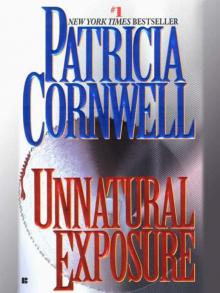 Unnatural Exposure
Unnatural Exposure The Bone Bed
The Bone Bed Book of the Dead
Book of the Dead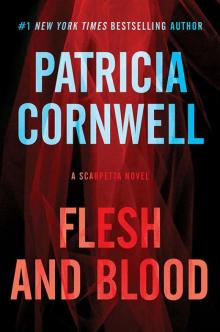 Flesh and Blood: A Scarpetta Novel (Scarpetta Novels Book 22)
Flesh and Blood: A Scarpetta Novel (Scarpetta Novels Book 22)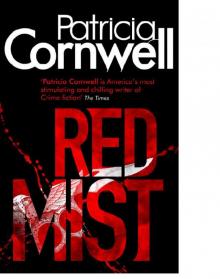 Red Mist
Red Mist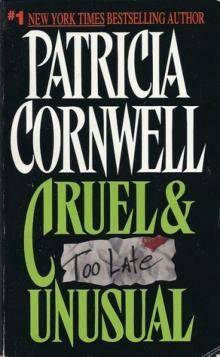 Cruel & Unusual
Cruel & Unusual Hornet's Nest
Hornet's Nest Four Scarpetta Novels
Four Scarpetta Novels Scarpetta's Winter Table
Scarpetta's Winter Table Isle of Dogs
Isle of Dogs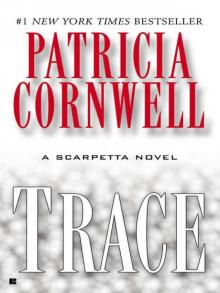 Trace
Trace Postmortem
Postmortem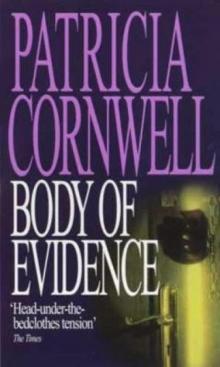 Body of Evidence ks-2
Body of Evidence ks-2 Southern Cross
Southern Cross All That Remains
All That Remains Point of Origin
Point of Origin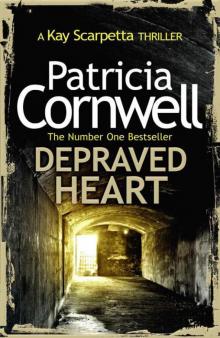 Depraved Heart
Depraved Heart Ruth, a Portrait: The Story of Ruth Bell Graham
Ruth, a Portrait: The Story of Ruth Bell Graham From Potter's Field
From Potter's Field Flesh and Blood
Flesh and Blood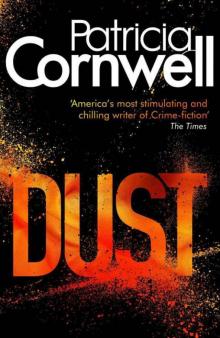 Dust
Dust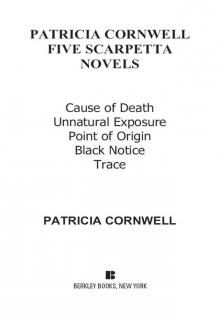 The Body Farm
The Body Farm Port Mortuary
Port Mortuary Quantum
Quantum Portrait of a Killer: Jack the Ripper - Case Closed
Portrait of a Killer: Jack the Ripper - Case Closed Spin (Captain Chase)
Spin (Captain Chase) Cause of Death
Cause of Death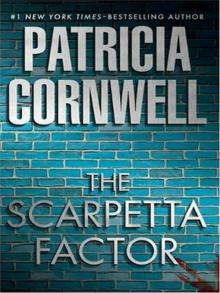 The Scarpetta Factor
The Scarpetta Factor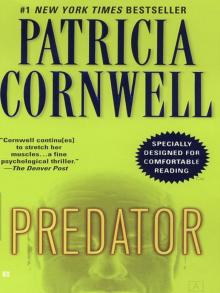 Predator
Predator Scarpetta 18 - Port Mortuary
Scarpetta 18 - Port Mortuary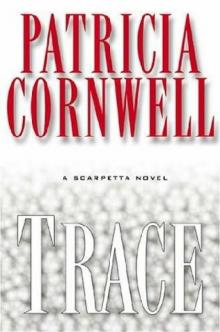 Trace ks-13
Trace ks-13 Portrait of a Killer
Portrait of a Killer Cruel and Unusual ks-4
Cruel and Unusual ks-4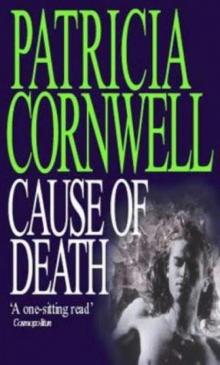 Cause Of Death ks-7
Cause Of Death ks-7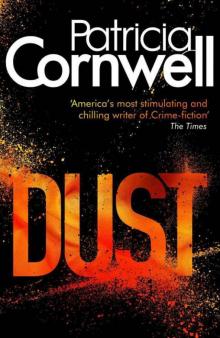 Dust ks-21
Dust ks-21 At Risk wg-1
At Risk wg-1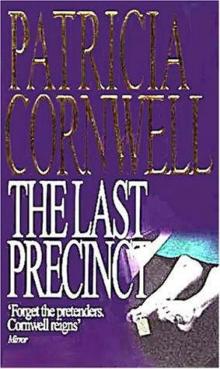 The Last Precinct ks-11
The Last Precinct ks-11 Book of the Dead ks-15
Book of the Dead ks-15 All That Remains ks-3
All That Remains ks-3 Ruth, a Portrait
Ruth, a Portrait Scarpetta's Winter Table (kay scarpetta)
Scarpetta's Winter Table (kay scarpetta) From Potter's Field ks-6
From Potter's Field ks-6 Scarpetta
Scarpetta Isle of Dogs jhabavw-3
Isle of Dogs jhabavw-3 Hornet's Nest jhabavw-1
Hornet's Nest jhabavw-1 The Body Farm ks-5
The Body Farm ks-5 Blow Fly ks-12
Blow Fly ks-12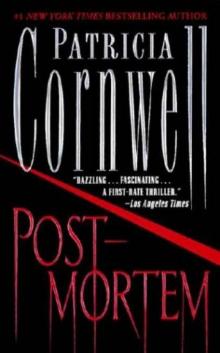 Post Mortem
Post Mortem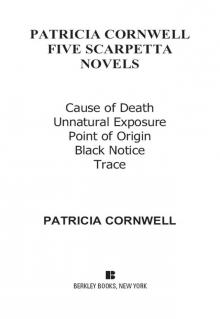 Five Scarpetta Novels
Five Scarpetta Novels Chasing the Ripper (Kindle Single)
Chasing the Ripper (Kindle Single) Point of Origin ks-9
Point of Origin ks-9 Port Mortuary (2010)
Port Mortuary (2010) Unnatural Exposure ks-8
Unnatural Exposure ks-8 Southern Cross uhabavw-2
Southern Cross uhabavw-2 The Bone Bed ks-20
The Bone Bed ks-20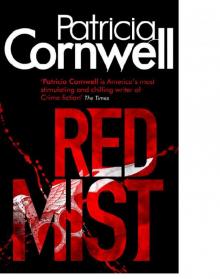 Red Mist ks-19
Red Mist ks-19 Port Mortuary (2010) ks-18
Port Mortuary (2010) ks-18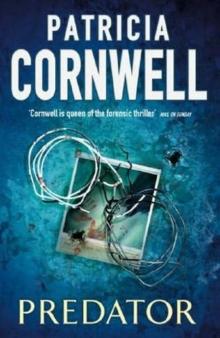 Predator ks-14
Predator ks-14